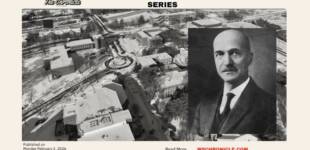Veterans symposium focuses on mental health
The Winston-Salem Urban League held a Veterans Services Symposium with an emphasis on mental health on Friday, Nov. 10.
Held at its headquarters the day before Veteran’s Day, the symposium and luncheon were part of the Urban League’s mental health initiative for underserved minorities. It showcased just how many services of are available to veterans. It also showed the need for them, hoping to dispel stigmas by encouraging veterans to get the benefits they earned and the mental health services they need.
Several veterans shared their stories of dealing with the traumas of war. Jerry Dodd, a Vietnam War veteran, said he thought he was fine when he came home. Then he found he couldn’t go out on a quiet street by himself because he was afraid something was going to happen. He started experiencing health problems, which he found out was due to his mental issues, and eventually saw a psychiatrist.
“When I returned home, I did not get any help,” said Dodd. “If I was not a former employee of Reynolds Tobacco Company, I would not have been able to see a psychiatrist. That was the way it was in 1968. Now it’s different, all the help is there that you need, so take advantage of everything that’s out there for you.”
Robert Williams, a Desert Storm veteran who was a bomb expert, described the trauma seeing his fellow soldiers die in horrific bombings. He said it’s still hard for him to sleep at night. He still doesn’t socialize with many people and avoids crowds. He said the Urban League’s Senior Community Service Employment Program (SCSEP) has helped him get retrained to work in Information Technology, which is helping him move on.
“That’s the way I’m moving forward to now,” said Williams.“I’m trying to put the past back.”
Carolyn Burns-Speller of Mindsight Counseling said it’s hard for a veteran’s loved one to understand what they’re experiencing.
“They can’t begin to imagine the trauma, the experiences, that the veterans have gone through,” she said.
She said depression, traumatic brain injury, substance abuse and post-traumatic stress disorder are very common among veterans, and stigma often prevents them from seeking help.
Veterans in attendance heard about a multitude of services available to them, including Veterans Administration’s Suicide Prevention Division and HUD-VASH Housing Program for homeless veterans; Disabled American Veterans (DAV), which helps veterans apply for benefits; and the Urban League’s Veteran’s Support Services, which connect veterans with services.
Some service providers who spoke also received awards from the Urban League, presented by County Commissioner Fleming El-Amin. They were Veterans Helping Veterans Heal, which offers transitional housing for homeless veterans; HARRY Veterans Outreach Services, which provides a variety of services for veterans; Whole Man Ministries’ Homes 4 Our Heroes, which provides permanent housing for homeless veterans; Goodwill Employment Veteran’s Service Program, which helps veterans find jobs; NABVETS, an advocacy group for black veterans; and Forsyth Rapid Re-Housing Collaborative, which finds housing for the homeless.









